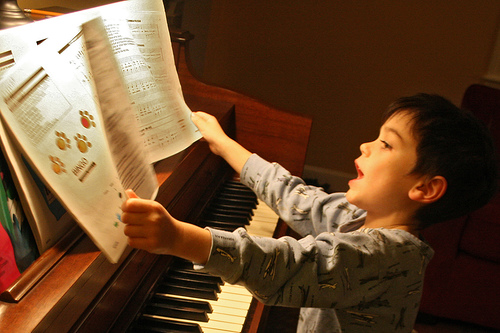 I forgot to put up the week’s new Forum Q&A post yesterday, so here it is a day late! Sorry about that…I think the term paper for my music history class is draining all my brain cells. =D
I forgot to put up the week’s new Forum Q&A post yesterday, so here it is a day late! Sorry about that…I think the term paper for my music history class is draining all my brain cells. =D
It was so fun to read the variety of approaches teachers use when it comes to summer lessons for last week’s Forum Q&A! I hope you had as much fun reading about them as I did. I just added my own comment which describes a new method I’m going to try next summer (2012), so please check it out and let me know what you think.
This week, though, we are going to discuss methods of obtaining and getting reimbursed for student materials! I’m curious to know….
First of all: Do you tell students to go purchase the new books/materials they need, or do you go and get them yourself?
Secondly, if you purchase them yourself, how do you go about getting reimbursement? Is the cost of books/materials covered in your tuition rate? Or do you charge a yearly or semesterly fee to cover books and materials? Or do you add the cost of the books to that month’s invoice for tuition?
I’m trying to decide how to go about dealing with getting books when I start my independent studio in the fall, so I’d love to hear what method works for you!
Photo Credit: woodleywonderworks | CC 2.0



I generally have the student purchase his/her books. I only have two students currently though, and we only use two books during cello lessons. I have also had one student go to solo and ensemble, and he bought his music for that as well. Personally, I don’t see a problem with having the students purchase their own materials, as it will help to expand their beginning music collections as well as get them familiar with the process of purchasing new music (where to go, online vs. in store, etc.) I haven’t had any students complain about purchasing new music either. If they did, or mentioned that it might be a problem, then I would probably purchase it for them so that they could have it.
I purchase the needed books and the student reimburses me before the end of that month.
I’ve found that often beginning students (even adults) have never set foot in a music store and wouldn’t know what to get. I just feel better buying it myself and knowing it’s right. I’ve had enough trouble with the actual stores getting my order wrong in the past!
I give my students two options:
1) Since I go to the local music store frequently, I can set aside the method books they need and they can go pick them up and pay for them on their own. I prefer this option, because it gives students the opportunity to browse through other books while they are there. I tell them to write down books they are interested in, and then I can check them out to see if they are the appropriate level – or suggest similar books if they need something easier/harder.
2) If the students/parents are reluctant to go to the store themselves, I will pick up orders for them. Since I pay for the books – the students must reimburse me when they receive them, either by cash or check. When doing this, I always make sure to copy the receipts so that I have what I need for filing taxes.
After a couple years working in a music store and hearing “My daughter’s piano teacher told me to buy her next books” and then getting to figure out which books they needed to buy, I purchase music for my students.
(Yes, most teachers did tell their students or write it down but many would forget that slip of paper when they came shopping. It’s amazing how many parents had no idea what books their child was currently using.)
I charge a yearly deposit to hold a student’s spot for the school year. It’s $30 for one student or $50 for a family (2+ kids). I deduct the cost of anything I buy for students from this deposit. I just keep track in a spreadsheet. Any money left at the end of may can be used towards summer lessons. If they run out of deposit money then they just pay me the amount. Students that quit mid year don’t get a refund.
I’ve LOVED this system. No more tracking down book money.
I used to buy the books for my students, but I’ve changed that in the last year – now I send them to get their books themselves. There is one major reason why I am now so adamant that they visit the music store – they get to see what’s out there in terms of sheet music! I know when I go to get a specific book, I end up wandering through all the sections like a kid in a candy store, and I always come away inspired (and usually with an extra book in my hand!). I want my students to start thinking about choosing some of their own music. However, they need to get into the store and start wandering around to see what music is out there, just waiting for them to pick it up and play it!
I now charge each student a $60 Materials’ Fee when they register for lessons. This usually is enough to make purchases during the school year. When they pre-register in May/June for the next school year, they pay this deposit again less any remaining balance.
I keep track of each student’s materials in their file folder by showing the initial fee of $60 and subtract each book purchased from that through the year. It is a simple way to track what each student has left at the end of the school year.
This has worked really well for me for years now after trying to have parents purchase needed materials and having them purchase the wrong books or waiting for reimbursement for any materials I purchased for them.
I obtain all music and materials for the student. This year I’m changing how I get paid for music. I charge a yearly registration fee which includes music and materials. I will keep account of how much each student spends on music so I can adjust the fee in future as I need to. Currently my students are all younger, and their books this year averaged around $40. My registration fee is $80. So half of that is for music, the other half for software, awards, etc. Any event fees are billed separately, as this varies a lot from student to student. I have a huge lending library, and this will also allow me to keep adding to it, and loan out books, try out different materials with students to find a good match, etc. I think it will give me more flexibility in the long run. You know how it can be: you buy a book for a student and either they move through it quickly, or they flounder in it, but your stuck, as they purchased the book. I want the ability to switch books as necessary, without impacting the student financially.
I look forward to trying this, and after a couple of years, if I need to change it again, I will.
In the past, I charged a book fee of $80 and a separate registration fee. When the book fee fell too low, I invoiced the parents for a new fee. I found parents liked knowing that tuition was the same each month. Easier for them to budget around. I think my new way will be the same for them, but give me more flexibility in making choices for my students.
I find it to be easiest and most efficient for me to charge an annual enrollment fee in July, which is for their books and recital fees throughout the year.
Loved reading everyone’s comments on this! In the past I lived in an area where there were many and easy access to music stores. Now I live in a rural area with no music stores so I let my students use my music rather than buying it. It has worked o.k. so are but I am now going to start charging a supplies fee as many are doing.
Thanks for this post!
I request that my students purchase their method and theory books. I also live in a rural area and have found it helpful to set up an account at Sheet Music Plus. I can email the parents with a list of required books a few weeks before needed, and I receive notification when the order has been placed. The parents can pay however it’s convenient for them. I keep a supply of supplemental “loaners” around for students to use (duets, required evaluation pieces, etc.). I will ask them to purchase the book if they need their own copy.
I charge a materials deposit at the beginning of the year and purchase all music for my students. I then deduct the cost of the materials from that deposit. If music purchases exceed the deposit amount, I bill the balance with the next month’s fees. This has worked great for me. I also live in a rural community and have found that it is easier for me to purchase online when possible.
Great topic, Joy! I’ve used a mix of strategies in the past– mostly buying books myself and giving parents an invoice. This last year, I have been sending parents lists of books via the Music List feature on Sheetmusicplus.com. This has worked well for me and I just wrote a post about it which you can read here:
http://missluba.com/2011/05/music-lists/
I email my students amazon.com links which they can use to purchase books. I stopped getting music for students outside of that unless special circumstances arise.
Hi Joy, i read your articles here and i think they are fantastic! You are a truly passionate teacher. I just want to share with you what i found on youtube:
a composition that i think can be used to teach to piano students, which song is happy but quite challenging, yet there are many elements and concept that can be taught, he even provide the music score:
http://www.youtube.com/watch?v=LqWtWxDtqwk